Are you considering competing in a Toastmasters’ speech contest?

Last year I competed in the contest for the international category, which can be about any topic. The winning speeches are usually inspirational or motivational with some element of humor, but not necessarily. The main thing I would recommend is that you be passionate about your message.
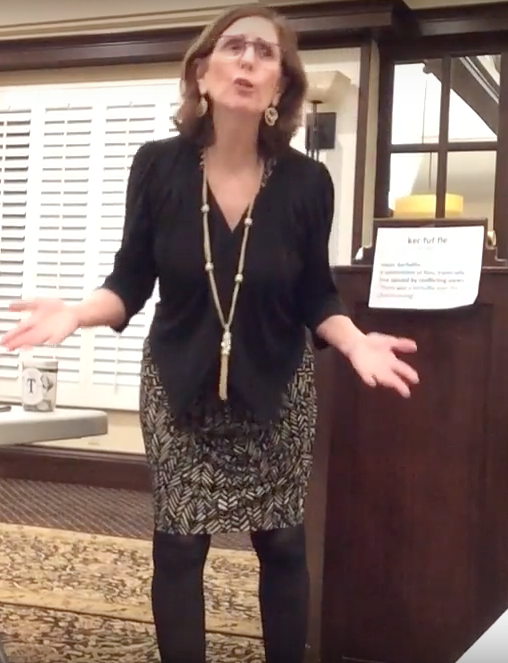
In case you haven’t read Parts 1 and 2, here are the links: Part 1 – District 12 International Speech Contest.
Part 2, What to Expect When Competing in a Toastmasters Speech Contest.
If this is your first time competing, you probably have hundreds of questions, but I’ll only be able to help you with some of them since I’m fairly new at this myself. Please don’t be shy like I was, afraid to ask questions.

Find an experienced speech competitor, someone who knows the ropes, and ask them all the questions you need answers to. You will feel more prepared when the time comes to give your speech
Multiple Rounds in One Day?
Before I forget, I want to mention you only compete once at the club, area, division, and district levels. By “once,” I mean on the day of the contest. When I attended my first area competition, I wasn’t sure if I would have to win a first round, then compete in another round that same day.

Whew! What a relief to learn there weren’t multiple rounds. So, basically, you will give your speech only once for each level of the Toastmasters International speech contest.

After I won the contest at my club, my mentor, Roya Ferdosian, DTM, suggested I practice my speech again prior to competing at each level. That was helpful advice, since I had revised the speech many times along the way. I practiced at my club, Club 12 – Pomona Valley Toastmasters, a couple more times prior to competing at both the area competition and then the division level. Each time, club members offered helpful advice for improvement. I made many changes, thanks to their input.
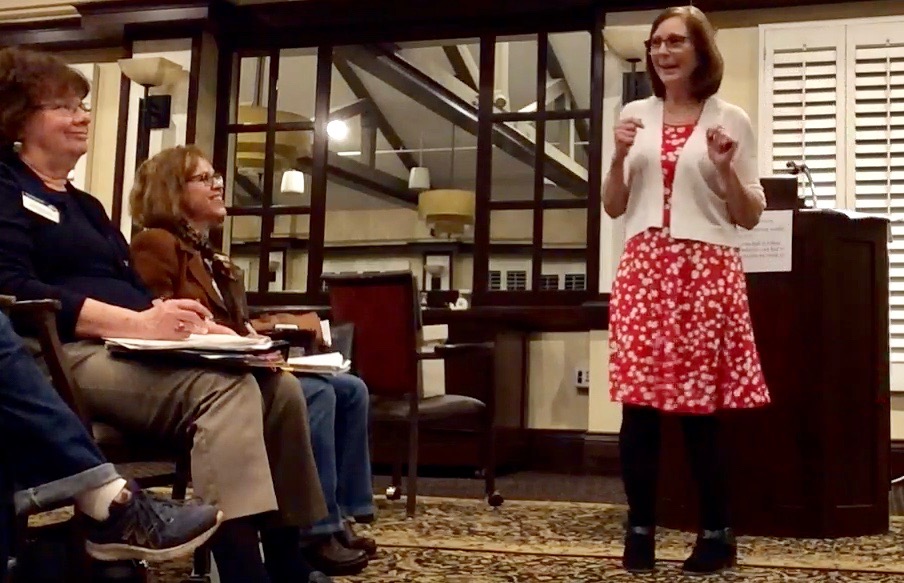
Keep Practicing
After winning at the division level, Roya suggested I contact other clubs and practice at their meetings. She gave me phone numbers for a couple of them. I used Google to find other clubs in my area and left a voice message for some and emails for other clubs that didn’t list a phone number.
Unfortunately, I only heard back from three of them. One club leader explained over-the-phone that they only permitted their own club members to give speeches. Oh well. I moved on and reached out to other clubs.

I was thrilled when Beth, leader of Toast of the Town in LaVerne, agreed to schedule me to practice at one of their meetings. Then Lois Sickling of Club 110 agreed to let me practice at Speech Masters. Both Beth and Lois seemed genuinely happy to have me as a guest speaker.

Speaking at Other Clubs
Members from both clubs were welcoming and they took turns giving me helpful tips. Some of the suggestions included:
- Use a hand gesture when mentioning “good news” and a separate gesture for “bad news.”
- Some of the pauses were too long, as if I forgot what to say. (I hadn’t forgotten my lines, but I needed a better sense of timing the pauses.)
- My voice was too high at times, a sign of nervousness.
- When mentioning the part about “drumming,” tap on my legs at the same time to have more impact, rather than tapping after I say it.
- Move across the stage more.
- Describe my father or say something about who he is.
- “I have good news and bad news” is cliche and is not a strong opening.
- I used way too many exaggerated hand gestures.
Finally, Lois suggested I ditch my cute dangling earrings because they moved too much and were distracting. “Wear studs instead.” Then more helpful advice, “Tuck your hair behind your ears to frame your face. It makes us look younger, too.”
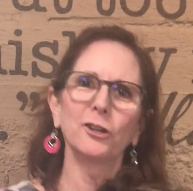
Enthusiastic Advice
The best advice I received was Lois’s enthusiastic, animated comments about using the stage more, such as walk across it, step back or to the front or both. Take advantage of the space that’s available. Make use of different levels. For instance, get down on your knes or reach up high or outwards. Her final words, “This is it. Give it your all and go for broke.” She was supportive and caring. It lifted my spirits.
I considered everyone’s suggestions and applied some of them and passed on others, which I decided wouldn’t work for me.
Below, I incorporated a move to get down on one knee, point at someone in the audience, and cover my head with my other hand when I said the line, “Get ready to duck!” Lois’s suggestion to get down lower at some point was a valuable tip. That change was made the day before the contest.
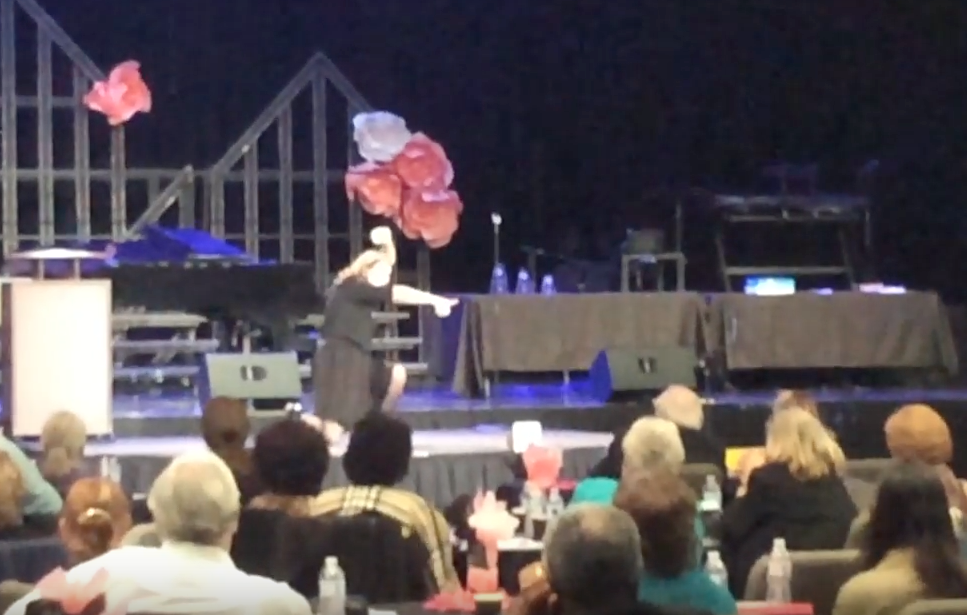
Keep in Mind
An important thing to keep in mind when receiving feedback for improvement: Don’t take it personally. Most toastmasters want to be helpful and want to see you succeed.
You may feel like they’re picking on you or being petty. After all, they’re criticizing not only your baby, your speech that you spent long hours pouring your heart into, but it may also seem like they’re insulting you, yourself. If someone is intentionally belittling you, hey, they’ve got a problem. Shame on them. They need to learn how to be nice, but most members are offering their honest input in order to help you so you can do your best. Some people seem blunt, and they probably don’t realize they come across that way.
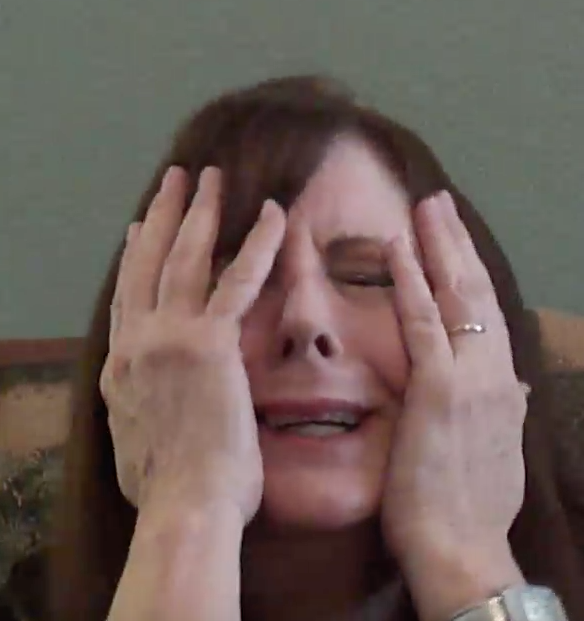
Learn to be Thick-Skinned
As a writer, I had to learn to be thick-skinned and listen to critiques of my stories, articles, and poems. It can be discouraging at times if there are too many negative points, but if we take everything personally and dwell on it, we risk letting it completely deflate us to the point we give up on our dreams. Take criticisms with a grain of salt. If a comment rubs you the wrong way, shake it off and move on. Believe me, most of us get our feelings bent out of shape at one point or another. Let it go and focus on your speech.
So, decide whether you want to apply any of the suggestions or not. You have the final say. It’s your speech. Unless you’re fortunate enough to have a coach, then that’s another story.
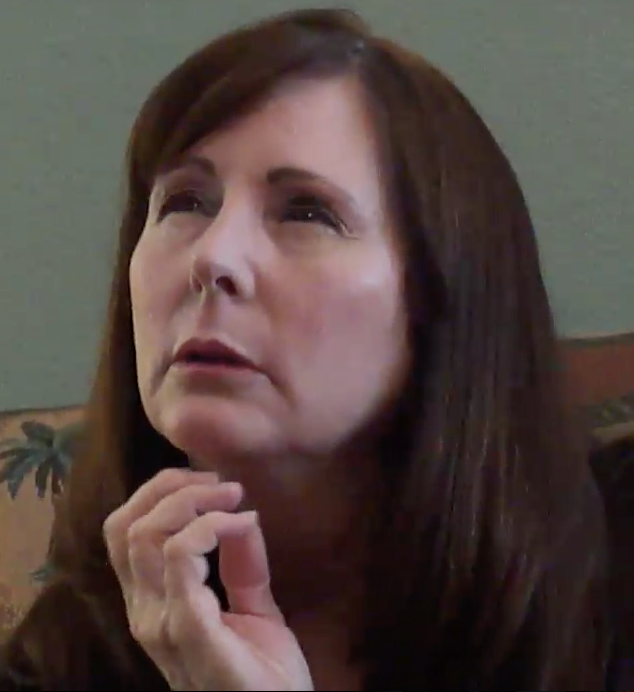
Also, while looking for clubs to practice at after I had won at the division level and prepared to compete at the district level, I wanted to know what I was in for, so I started doing some research to find out what came after the district level. For instance, how many levels are there, and how much traveling would be required? How much would it cost? All these issues are covered in Part 2.
Speaker Leader Champion
In the meantime, I started watching speeches of Toastmasters World Champions on YouTube. I liked Ryan Avery’s speech, and somehow I discovered he wrote a book: Speaker Leader Champion: Succeed at Work Through The Power of Public .Speaking. This was the book I needed to answer many of my questions.
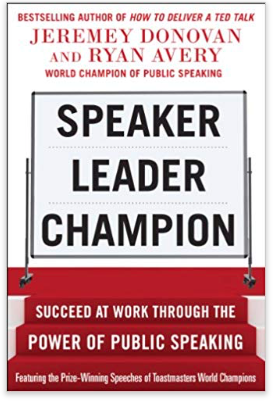
However, it was while watching a different video on YouTube showcasing some of the finalists preparing for the big day, and one guy (I don’t remember his name) mentioned he had to finish his second speech. A second speech? Huh? I pretty much freaked.

On a whim, I decided to reach out to Ryan Avery to ask him if contestants needed a second speech if they make it to the finals, and I also wanted to tell him how much I enjoyed his book. Honestly, I figured he’d be way too busy to answer me, but he’s a such a gem, he answered me right away and offered some very valuable tips. Here’s basically what he said:
Advice From Ryan Avery:
“I’m so glad you like the book Speaker Leader Champion. That is exactly what we wrote the book for, is for people who want to compete and be better speakers so they can champion any cause . . . Here are a few tips and suggestions and opinions solely from my experience of competing:
First Piece of Advice
“First, never think about the competition that’s after the competition you have, so don’t think about semi-finals. Don’t think about World Championship. Solely focus on district’s, because what happens is, too many people focus on the one afterward and they forget about being in the moment and delivering the message from the heart to that audience, and then they don’t even advance.
Second Piece of Advice
“My second piece of advice is to go early to see what the stage setup will be like. Know where you want to sit; know how you will go on and off the stage. A lot of people make the mistake of slowly walking up on stage or slowly leaving off stage after their speech, or they breathe deep after their speech.
Look at All the World Champions
“People are going to remember what they see first and what they feel last, and so if you send a signal of a sigh, that means you just tried to get through with it, but if you look at all the world champions, what they do is they will run off the stage and they’ll wave and they’ll be excited and they’ll look, and it will be a way to show the judges and the audience that, wow, you delivered the message that you wanted to deliver.”

Third Piece of Advice
“The third piece of advice I have for you is, speech lineup doesn’t matter. All world champions have been in all positions, from first all the way through ninth. So, be happy with the speaking order that you have.
“Make sure that you cheer on the other contestants, and also go to the conference. Be a part of the conference.
“Speak from the heart, have fun, and be in the moment. It goes by really fast.”

Is that awesome advice from Ryan Avery or what?
Notice he didn’t answer my question about whether I would need a second speech. He was right about how I needed to focus on the upcoming speech. If I won the district competition, then I could focus on what came next.
In case you’re wondering, I did learn semi-final contestants do need a different speech if they advance to compete in the finals. So, you might want to start writing a second speech, or if you already have one, work on tweaking it. Revise, revise, revise.

More tips from another World Champion of Public Speaking
The other night I went to a Toastmasters meeting in Covina, California to hear guest speaker, Darren LaCroix. He’s the 2001 World Champion of Public Speaking.
It was amazing. Darren LaCroix is full of inspiration and offers guidance for anyone who wants to improve their public speaking skills. It was easy to connect with him. I was so impressed with his presentation and his message, I signed up for Stage Time University.
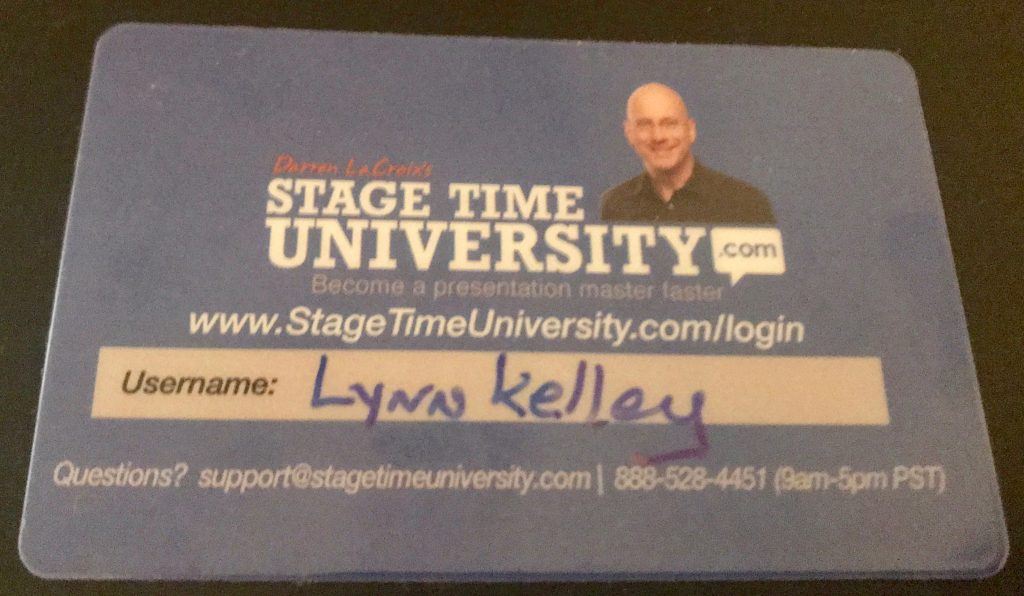
So far, I’ve only spent a few days on the site, but I’m so glad I joined. These classes are exactly what I need to grow and improve my skills.
A Helpful Blog Post
In this blog post, Darren LaCroix shares clips of the three 2018 winners and offers his feedback as far as what the contestants did that worked and what they could have done to improve their speeches.
Next, I’m going to share some videos that are well worth watching. There are plenty more on YouTube, so watch as many world champion videos as you can because you’ll learn a lot from them.
Below is a presentation by David Henderson, 2010 World Champion of Public Speaking. If you don’t have time to watch the whole thing, be sure to watch his speech, “The Best Doctor,” which starts at the 42:00 point.
Next, Ryan Avery’s winning speech. He won the World Champion of Public Speakers in 2012.
Last but not least, Darren LaCroix’s 2001 winning speech, “Ouch.” Many people consider this to be the funniest speech in the history of the World Championship competition.
Both Ryan Avery and Darren LaCroix tell us to speak from the heart. Your message should be one you are passionate about and want to share with others.
Cheers to you for taking the step to compete. Wishing you much success in your journey, and I hope you enjoy all the adventures along the way!
Related posts:
Becoming a Public Speaker – Say What?
District 12 International Speech Contest – Part 1 – What a Grandastic Adventure
What to Expect When Competing in a Toastmasters Speech Contest – Part 2 – Learn the Rules
Stepping Out of the Zone – My Toastmasters Ice Breaker Speech!
What are your thoughts? Are you a public speaker?
If so, how did you overcome your fears?
Do you have a message you’re passionate about?
How do you share your message?
Photo credits: Heart Sunset by MA Hudson – Flickr WANA Commons, Desk and laptop by Shan Jeniah Burton – Flickr WANA Commons


Toastmasters sounds like fun! I am not afraid of public speaking, but I don’t know if I could do it competitively. Kudos to you again for your division win – what a payoff for all your hard work and effort!
Thanks, Jennette. I learned so much. Yay that you’re not afraid of public speaking. I hope you will be a keynote speaker at some RWA conferences and lots of book signings!
Wow, what a fantastic post, Lynn, it’s so packed with helpful information! A very nice round up of info and I loved watching the clips. So inspirational.
I thought Ryan Avery’s tips were especially good. Thank you! 🙂
Hi Yvette! I’m so glad you enjoyed the post. I hope all the info helps with your next speech. Triple Threat Yvette! I don’t call you that for nothing. You have so much talent and so much inspiration to share with the world. Thanks for stopping by!